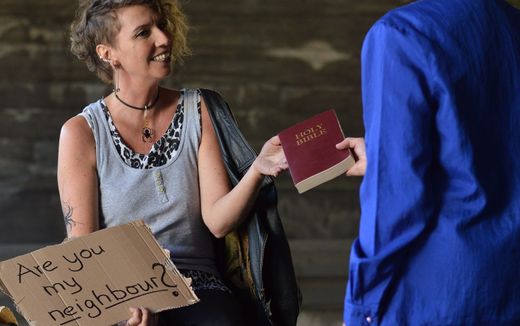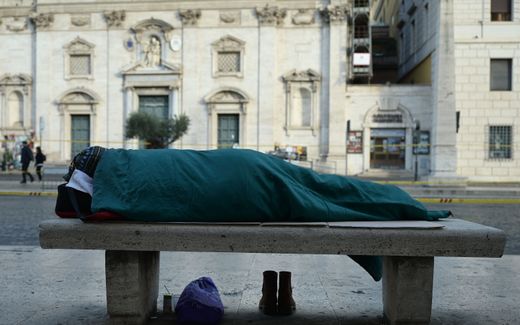Methodist welfare work in Hungary in danger because of “corrupt” Orban regime

Peeling the potatoes is a huge chore in the Oltalom charity in Budapest. Photo Facebook, Oltalom Karitatív Egyesület
Central Europe
Does the Hungarian government send the homeless people back to the streets of Budapest? Thousands will die if the government insists on stopping the Methodist funding. The church struggles with the “corrupt” Orban government about tax revenues for welfare work.
In several press statements, the Hungarian Evangelical Fellowship (HEF, or: Magyarorszagi Evangeliumi Testverkozosseg, MET) mentions a number of 40,000 homeless and other “vulnerable people” they care for. Apart from this, the church has a school for Roma kids, with a daily food service in the school. The church is also connected with the work for immigrants, a sensitive issue in Hungary. The Wesleyan denomination is active with a hospital and a clinic and also has a theological college.
At least 100 of the 1,000 employees of the Methodists have left the organisation (10 per cent) because they cannot be paid. The others don’t receive their full salary.
In the Hungarian system, churches that have been officially “recognised” receive money from the state. On the tax form, citizens can mark the Hungarian Evangelical Fellowship as the preferred church where 1 per cent of their income should go.

Although the HEF is a small denomination (19,000 members), it was the fourth community in terms of tax advantages in 2022. Only the ‘big’ Catholics, Calvinists and Lutherans were larger than this small group of Wesleyans. According to HEF, this number has grown in the last few years.

By using this system, the HEF depends on the government financially. A few years ago, the Methodists became more independent by raising direct support. The church says the results of that are encouraging in a press release, but that is still not enough. “If every member of the wealthiest one per cent of Hungarians would support our work with the price of two kilos of bread”, a recent press statement says, “we would be able to function without interruption.” Also, some city councils have decided to support the HEF activities.
However, the Hungarian Tax Authority (NAV) says that the cutbacks have a reason: because the HEF did not pay income tax for many years. The total sum could be 3.9 million euros. In October 2021, two years ago, armed personnel of the NAV raided the premises of the HEF and confiscated papers and computers, according to a HEF press release. Two weeks ago, the NAV spoke about the “illegal activities” on the part of the HEF. A government spokesperson said the state does not owe money to the church.
The HEF has existed since 1973. During the Communist era, Gabor Ivanyi could no longer live with state interference in the church and was kicked out of the Hungarian Methodist Church. In 1981, the HEF was officially recognised as an independent church. After the regime change, the HEF took social work over from the state.
During those years, Ivanyi got into contact with Viktor Orban; they worked together against the Communist regime. After the change, Ivanyi did the Christian liturgy for the marriage of the Orban couple in 1993 and the baptism of two of their five children.
However, when Orban was sworn in as prime minister for the second time in 2010, Gabor Ivanyi refused to pray during the ceremonies. He was critical of Orban’s Christian nationalism. According to Ivanyi, this was a humiliation for Orban. To several branches of the international press, he said that this personal quarrel was the cause of the legal battles that followed since. Because of his prestige and charisma, Ivanyi has many international contacts and receives funding from Western organisations.
During a press conference in August, Gabor Ivanyi spoke about “persecution” by the “greedy, corrupt Orban regime”, which is even a “dictatorship”. The administration is full of “crimes”, he said. “The Hungarian State is run by people who, in a decent democracy and a state governed by the rule of law, would spend a long time in prison.”

Shortly after 2010, the new Fidesz government came with a new Church Law. The main goal for this was to limit the number of “recognised churches” since many groups and cults were registered as churches, not because they had a deep belief but because you could make money with it.
Also, the Hungarian Evangelical Fellowship was scrapped from the law. The government was corrected because of this by the European Court of Human Rights (ECtHR) in Strasbourg. But since the church recognition is a parliamentary act in Hungary –and not from administrative officials– this remains to be ratified.
Last week, the HEF released a statement at a press conference calling the “friends of freedom of religion to support HEF’s struggle. Partners of Hungary in the international community should demand the restoration of the status and rights of HEF as a critical component of the general restoration of the rule of law in Hungary”.
Related Articles









